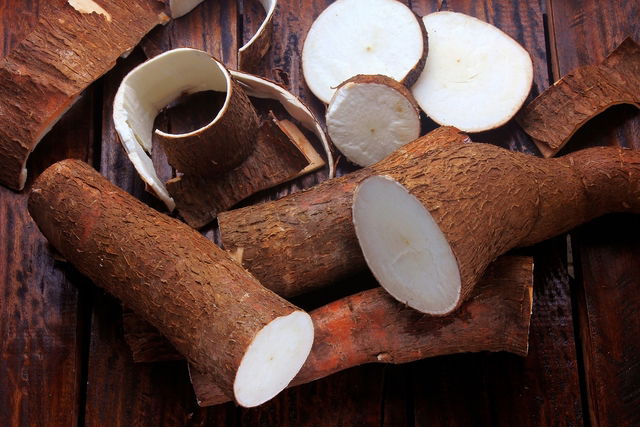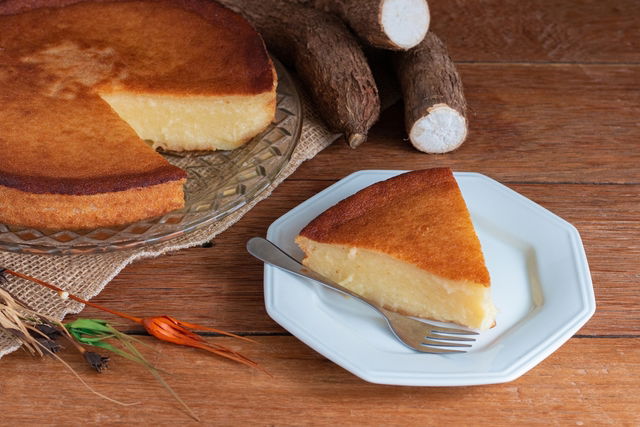Cassava is a tubercle that is rich in fiber and can help to manage sugar and cholesterol levels in the blood. It can therefore prevent diseases like diabetes, heart attack and stroke, as well as improve intestinal flow.
Cassava contains resistant starch, a type of carbohydrate that is not digested and acts similar to fiber in the body). It can therefore feed the beneficial bacteria in the gut and improve digestion. It can also be ingested to prevent conditions like constipation, gastritis or intestinal cancer.
Cassava is usually sold at grocery stores and can be boiled or baked to accompany eggs, meat and salads or used as a base for soups. It can also be used in purees, cakes bread, or tapioca, sagu and tapioca crepes.

Health benefits of Cassava
The main health benefits of cassava are:
1. Preventing cardiovascular diseases
Cassava contains great amounts of fiber, which are compounds that help to reduce the absorption of fat. It helps to reduce LDL cholesterol in the blood, which can prevent diseases like heart attack, atherosclerosis and stroke.
In addition, cassava also contains potassium and magnesium, minerals that help to eliminate excess sodium in the urine and promote blood vessel relaxation. This can help to prevent high blood pressure.
2. Improving energy and mood
Because it is high in carbohydrates, cassava can help to improve energy and mood and keep these levels high during the day. That means this tubercle can be a great dietary addition for people who exercise frequently or work in high-activity jobs, like construction workers, mail delivery, farmers and garbage collectors.
3. Helping to manage diabetes
Cassava can help to manage diabetes, as it contains fiber and resistant starch. These help to reduce the speed of sugar absorption into the blood, which can promote more balanced levels of glucose.
4. Promoting skin, nail and hair health
Cassaba is a source of vitamin C, which is a nutrient that helps to boost collagen production and absorption. This can help to improve skin and hair elasticity, as well as strengthen the nails.
5. Improving digestion
Cassava contains great amounts of resistant starch, which can balance intestinal flora, improve digestion and prevent the development of digestive conditions, like gastritis and ulcers.
6. Strengthening the immune system
Because it contains vitamin A, vitamin C and carotenoids (which are components with potent antioxidant action), cassava can help to strengthen immune system cells against infection. This can help to prevent the development of allergies, colds and the flu.
7. Aiding weight loss
Cassava has high amounts of resistant starch and fibers, which are nutrients that reduce digestion time. Therefore, cassava can help to keep you full and reduce appetite throughout the day, leading to weight loss.
8. Preventing some types of cancer
Because it is high in vitamin C, flavonoids, carotenoids and vitamin C (which are components with antioxidant action), cassaba can help to combat excess free radicals and strengthen the immune system. This can help to prevent some types of cancer, like intestinal, stomach and breast cancers.
9. Improving mood
The resistant starch present in cassava can promote balanced levels good intestinal bacteria in the gut, which promotes the production of serotonin. This neurotransmitter is responsible for mood regulation and overall wellbeing.
10. Preventing constipation
The pectin and beta-glucan fibers present in cassava can help to hydrate the stool and assist with easier bowel movements.
Cassava also contains resistant starch, which is a type of carbohydrate that serves to feed the good bacteria in the gut. Therefore, it can help to maintain optimal levels of good bacteria in the gut and prevent constipation.
Can cassava cause weight gain?
Cassava contains a great amount of carbohydrates and calories, and can lead to weight gain if eaten in excess.
However, because of its high fiber content, cassava can keep you full and reduce hunger throughout the day. Therefore, if eaten in moderation, it can actually be incorporated into a weight loss diet.
Nutritional information
The following table contains nutritional information for 100 g of cassava, which is equivalent to 3 tablespoons of boiled cassava:
To obtain all the benefits cassava has to offer, it is important to incorporate into a healthy, balanced diet and to exercise regularly.
How to eat Cassava
Cassava can be boiled and used as a side for other meals, like eggs, meat and salads. It can be eaten at breakfast, snack, lunch or dinner, and used in recipes for cakes, purees, soups, or broths, It can also be sliced and baked to make chips.
It is important to highlight that cassava should not be eaten in its raw form because it contains hydrogen cyanide. This compound can be toxic and cause symptoms like nausea, vomiting, seizures, shortness of breath, and, in serious cases, death.
Healthy recipes

Cassava can be used in healthy recipes, like soup, chips, cakes or purees.
1. Cassava cake
Ingredients:
- 500 g of cassava
- 3 eggs
- ¾ cups of brown sugar or 3 tablespoons of sweetener
- 1 cup of milk (cow or plant-based)
- 100 g of freshly grated coconut, or dehydrated, unsweetened coconut
- 1 teaspoon of butter (to grease the pan)
How to prepare:
Preheat the oven to 350 ºF (or 180 ºC). Grease a loaf pan with butter and set side. Thoroughly wash, peel and chop the cassava into small pieces. Then place the cassava, eggs, sugar (or sweetener) and milk in a blender and mix until you reach a homogenous batter.
Transfer the batter into a bowl and add the grated coconut, being sure to stir by hand. Then pour the batter into the greased pan and bake for 40 minutes, until golden. Wait for it to cool before serving.
2. Cassava flour with chicken
Ingredients:
- 500g of cassva
- 2 medium onions
- 3 cloves of garlic
- 2 cups of pulled chicken (cooked)
- 1 tablespoon of olive oil
- 1 tablespoon of chopped parsley
- Salt and pepper
How to prepare:
Wash, peel and chop the cassava into cubes. Chop the onion and garlic in small cubes and set aside. Place the cassava in a pot and cover with water. Cook on medium heat until soft. Wait for the cassava to cool and carefully mix it in a blender. Add the water from the pot into the blender a bit at a time, until a thick broth develops.
In another pot, add the olive oil, onion and garlic and stir fry for 5 minutes. Then add the stir fry to the mandioca cream, as well as salt, pepper, parsley and pulled chicken. Stir with a wooden spoon. To dilute the broth, you can add more water. Wait for it to cool and serve.
3. Cassava chips
Ingredients:
- 500 g of cassava
- 4 tablespoons of olive oil
- Salt and pepper to taste
How to prepare:
Preheat the oven to 390 º (or 200 ºC). Wash, peel and chop the cassava into thin slices. Season with the olive oil, salt and pepper. Grease a pan with more olive oil. Spread the cassava over the pan and bake in the oven for 15 minutes (or until they become golden). Flip the cassava with tongs and bake the other side for another 14 minutes, until they become golden and crispy.
